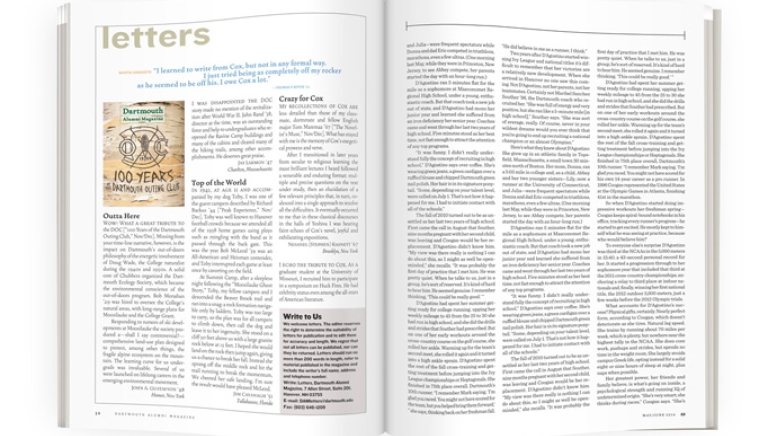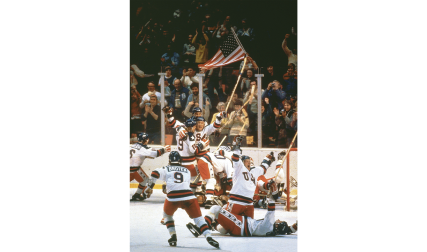Outta Here Wow! What a great tribute to the DOC [“100 Years of the Dartmouth Outing Club,” Nov/Dec]. Missing from your time-line narrative, however, is the impact on Dartmouth’s out-of-doors philosophy of the energetic involvement of Doug Wade, the College naturalist during the 1940s and 1950s. A solid core of Chubbers organized the Dartmouth Ecology Society, which became the environmental conscience of the out-of-doors program. Bob Monahan ’29 was hired to oversee the College’s natural areas, with long-range plans for Moosilauke and the College Grant.
Responding to rumors of ski developments at Moosilauke the society produced a—shall I say controversial?—comprehensive land-use plan designed to protect, among other things, the fragile alpine ecosystem on the mountain. The learning curve for us undergrads was invaluable. Several of us were launched on lifelong careers in the emerging environmental movement.
John A. Gustafson ’48 Homer, New York
I was disappointed the DOC story made no mention of the revitalization after World War II. John Rand ’38, director at the time, was an outstanding force and help to undergraduates who reopened the Ravine Camp buildings and many of the cabins and cleared many of the hiking trails, among other accomplishments. He deserves great praise.
Jay Larmon ’47 Charlton, Massachusetts
Top of the World In 1941, at age 11 and accompanied by my dog Toby, I was one of the guest campers described by Richard Backus ’44 [“Peak Experience,” Nov/Dec]. Toby was well known to Hanover football crowds because we attended all of the 1938 home games using ploys such as mingling with the band as it passed through the back gate. This was the year Bob McLeod ’39 was an All-American and Heisman contender, and Toby interrupted each game at least once by cavorting on the field.
At Summit Camp, after a sleepless night following the “Moosilauke Ghost Story,” Toby, my fellow campers and I descended the Beaver Brook trail and ran into a snag: a rock formation navigable only by ladders. Toby was too large to carry, so the plan was for all campers to climb down, then call the dog and leave it to her ingenuity. She stood on a cliff 30 feet above us with a large granite rock below at 15 feet. I hoped she would land on the rock then jump again, giving us a chance to break her fall. Instead she sprang off the middle rock and hit the trail running to break the momentum. We cheered her safe landing. I’m sure the result would have pleased McLeod.
Jim Cavanagh ’51 Tallahassee, Florida
Crazy for Cox My recollections of Cox are less detailed than those of my classmate, dormmate and fellow English major Tom Maremaa ’67 [“The Novelist’s Muse,” Nov/Dec]. What has stayed with me is the memory of Cox’s exegetical prowess and verve.
After I transitioned in later years from secular to religious learning the most brilliant lectures I heard followed a venerable and enduring format: multiple and precise questions on the text under study, then an elucidation of a few relevant principles that, in turn, coalesced into a single approach to resolve all the difficulties. It eventually occurred to me that in these classical discourses in the halls of Yeshiva I was hearing faint echoes of Cox’s novel, joyful and exhilarating expositions.
Nesanel (Stephen) Kasnett ’67 Brooklyn, New York
I echo the tribute to Cox. As a graduate student at the University of Missouri, I recruited him to participate in a symposium on Huck Finn. He had celebrity status even among the all-stars of American literature.
I recently mailed him a copy of a book I wrote. I sincerely hope he has not read it past the preface. It begins, “There is a story behind the writing of this book. It is something I owe to an old college professor.” The professor was James M. Cox.
Paul Taylor ’78 Webb City, Missouri
Cox was crazy! And I say that with the utmost respect and adoration. He just ranted for the whole period. He was on fire with enthusiasm.
I can still hear him quoting Emerson’s essay Self-Reliance: “Trust thyself: Every heart vibrates to that iron string.” The last five words he really did growl and roar. Then he’d kind of cackle to himself because “iron string” was so vivid an image.
I learned to write from Cox, but not in any formal way. I just tried being as completely off my rocker as he seemed to be off his. He growled our first assignment, “Write a paper for English 75!” So, insanely, I titled mine “A Paper for English 75” and proceeded to rant like Cox: “We are all writing papers, forcing into that sublime space those kernels of derived knowledge we so fallaciously call ‘learning.’ ”
He had said something about our papers being “educational thermometers,” so I ended that first paragraph with: “A paper is not an evidence of what we have gained so much as it is an evidence of what we are gaining. It is not an educational thermometer….It is the very heat.” Of course I was nuts, but he loved it.
I sobered up, got better and wrote comparisons of Emerson and Whitman as well as of Cleaver and Baldwin. I owe Cox a lot.
Thomas P. Boyer ’70 St. Pete Beach, Florida
High on Kim I have not been this excited about a new Dartmouth president since John Kemeny took office during the Vietnam War protests in the tumultuous spring of my senior year. Thanks for the in-depth article [“Taking Charge,” Sept/Oct] on another surprise choice with enormous promise.
Terry Shumaker ’70 Concord, New Hampshire
Not a Pretty Picture Sadly, the artwork of Daniel Heyman ’85 “The Art of War” [Sept/Oct] could address so many more atrocities that have occurred: an Al Qaida beheading, the aftermath of a suicide bombing in a crowded market and a woman being flogged because a mullah decreed that the hem of her burqa was three centimeters too short!
Paul N. Wenger Jr. ’51 West Hartford, Connecticut
Rethinking Reunions I agree with “Time for a Bigger Tent” [July/Aug] but would go even further. My own reunions have always been scheduled with the classes before mine, but most of my close friends were in the classes after mine. Navy duty and geography conspired to keep me from early reunions; as a result I never developed the class reunion habit.
In 1997 the Dartmouth Aires held their 50th reunion, inviting Aires from the classes of 1947 through 2000. This diversity of age united by an ageless commonality was so fulfilling that I’ve attended every subsequent reunion: 2000, 2003 and 2007. It’s great to see my age peers, but it’s even more fascinating to discuss as equals topics ranging from first-job hunting to retirement.
Attending reunions is a habit that feeds by strengthening relationships with people you care about. It’s possible that I might have developed the habit of attending class reunions if I could have seen more of my close friends or if I could have had more flexibility in scheduling. Maybe not. Overall, though, the “class of XX” segregation into groups of three classes has hindered, not motivated, my visits to Hanover.
Robin Felix ’75 San Diego, California
Well Said Walter Knoepfel ’66, in his letter referring to the choice of words employed by coach Buddy Teevens ’79 [“Letters,” July/Aug], reminded me of an experience I had as Dartmouth’s golf coach. When after a shot of mine on the golf course longtime English professor Henry Terrie asked, “How did you hit that one, coach?” I replied with “I hit it good.” In his chairman of the department voice Professor Terrie queried, “You mean you hit it well?” “No, Henry,” I replied. “English professors hit the ball well. Golf coaches hit it good!”
Bill Johnson Southern Pines, North Carolina
Keeping the Faith Your correspondent missed a key point in your story about Stuart Kauffman ’61 [“God Is in the Details,” May/June]. Kauffman states, “Natural selection alone could not account for the richness of life.” Later he is “searching for the initial conditions that allowed life to coalesce from a primordial soup,” all the while speaking of “chaos” and the random wandering of the elements. Finally, Dartmouth professor Mark McPeek says, “We haven’t proved or disproved the existence of God.”
Therein lies the key. No one can say with any degree of certitude that during the chaos of random bumping-intos there was not some supernatural something-or-other encouraging the “good guys” to find each other (coalesce, if you will) while discouraging the less desirable and keeping them out of the mix. We may call that “whatever-it-might-have-been” (fill in the blank). Science may have stopped at that point, but here is the beginning of faith.
Hal Johnston ’47 Montrose, Colorado




